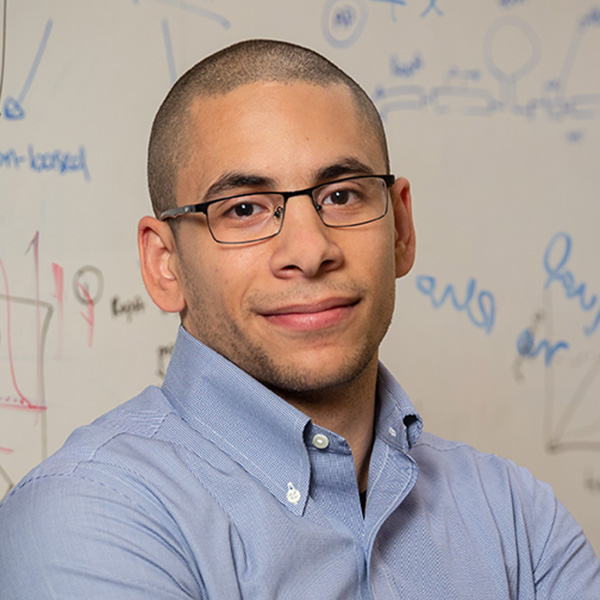Source: Interfolio F180

Ahmed Badran, PhD
Scripps Research Joint Appointments
Research Focus
Biological engineers routinely harness the predictability of the central dogma to modify living organisms. However, this rule cannot be easily extended to manipulations of integrated signaling networks such as central dogma, as even minor perturbations can have significant and often deleterious consequences on cellular viability. Our lab is developing and applying methodologies to study the most central biomolecular machines in living systems. We aim to understand their molecular capabilities, and to extend these capabilities to new-to-nature bioactivities. We combine principles of chemical biology, bioengineering, directed evolution, genome editing and synthetic biology to (re)engineer highly integrated cellular signaling networks towards researcher-defined function. Our research interests are broad and are focused on addressing issues of immediate global impact, namely antimicrobial development, biologics production, information maintenance and transmission, and climate change. Our work is currently supported by Scripps Research, NIH Director’s Early Independence Award, NASA, DTRA, and NIBIB.
ISSUED & PENDING U.S. PATENTS
Negative selection and stringency modulation in continuous evolution US 10,179,911
Evolution of TALENs US 10,612,011
Evolution of BT Toxins US 2017/0029473 A1
Evolution of Proteases US 2017/0233708 A1
Vector-based mutagenesis system US 2018/0087046 A1
Continuous Evolution for Stabilized Proteins US 2020/0216833 A1
Education
Ph.D. (Chemical Biology), Harvard University, 2016B.S. (Biochemistry, Molecular Biophysics, Molecular & Cellular Biology), The University of Arizona, 2010
Awards & Professional Activities
2010 NSF Graduate Research Fellowship2013 Certificate of Distinction in Teaching, Harvard University
2014 Christensen Prize for Outstanding Research Achievement, Harvard University
2014 GSAS Merit Fellowship, Harvard University
2015 Christensen Prize for Outstanding Research Achievement, Harvard University
2017 Reaxys Ph.D. Prize Finalist, Harvard University
2017 NIH Early Investigator Award, NIH
2021 1R01EB031124-01, NIH
2021 7DP5OD024590-02 Early Independence Award, NIH
2023 FA9550-23-1-0116, Air Force Office of Scientific Research
2023 SLOAN FDN/G-2023, Alfred P. Sloan Foundation
2023 Adam R. Scripps Foundation
2023 Breakthrough Energy Fellows
2023 J-WAFS Water and Food Grand Challenge
2023 U.S, Army Medical Research
2024 Foundation for Foor and Agriculture Research
2024 Homeworld Collective
Selected Publications
Kolber, Natalie S.; Fattal, Ranan; Bratulic, Sinisa; Carver, Gavriela D.; Badran, A H. Orthogonal translation enables heterologous ribosome engineering in E. coli. 2021, 12, 599.
[View]
Lopatkin, Allison J.; Bening, Sarah C.; Manson, Abigai L.; Stokes, Jonathan M.; Kohanski, Mich A.; Badran, A H.; Earl, Ashlee M.; Cheney, Nicole J.; Yang, Jason H.; Collins, James J J. Clinically relevant mutations in core metabolic genes confer antibiotic resistance. 2021, 371.
[View]
Johnston, Chad W.; Badran, A H.; Collins, James J J. Continuous bioactivity-dependent evolution of an antibiotic biosynthetic pathway. 2020, 11, 4202.
[View]
Costello, Alan; Badran, A H. Synthetic Biological Circuits within an Orthogonal Central Dogma. 2021, 39, 59-71.
[View]
Stokes, Jonathan M.; Yang, Kevin; Swanson, Kyle; Jin, Wengong; Cubillos-Ruiz, Andres; Donghia, Nina M.; MacNair, C R.; French, Shawn; Carfrae, Lindsey A.; Bloom-Ackermann, Zohar; Tran, Victoria M.; Chiappino-Pepe, Anush; Badran, A H.; Andrews, Ian W.; Chory, Emma J.; Church, George M.; Brown, Eric D.; Jaakkola, Tommi S.; Barzilay, Regina; Collins, James J J. A Deep Learning Approach to Antibiotic Discovery. Cell 2020, 181, 475-483.
[View]
Komor, Alexis C.; Badran, A H.; Liu, David R. Editing the Genome Without Double-Stranded DNA Breaks. 2018, 13, 383-388.
[View]

